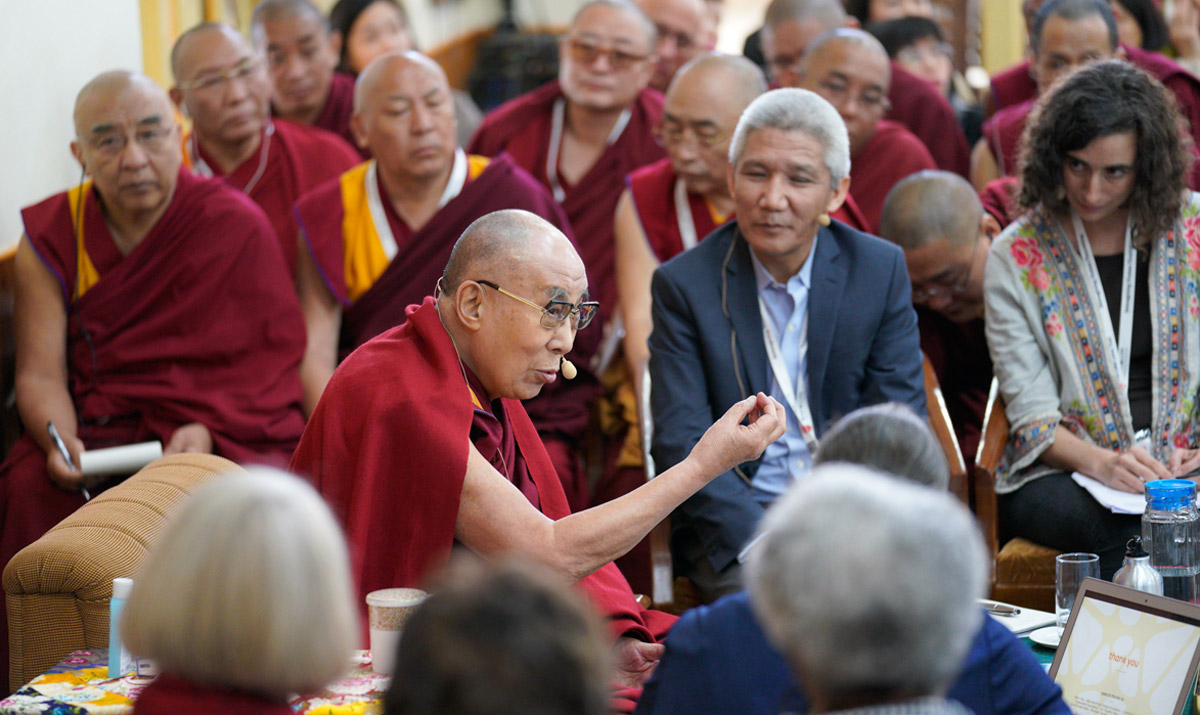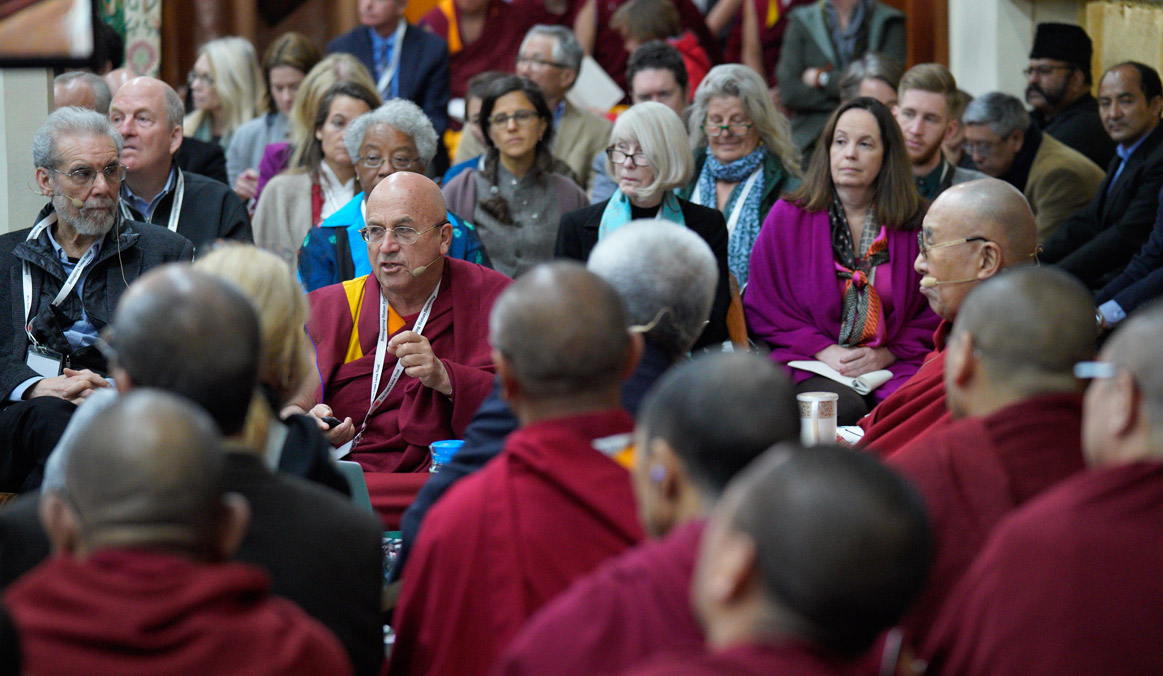Many of the researchers who presented at the conference trace their personal and professional inspiration to previous Mind & Life Dialogues and the Dalai Lama’s own educational vision—what he calls “educating the heart.”
As the Dalai Lama has insisted in numerous public talks and his popular writing, humankind cannot afford to repeat the bloody conflicts of the 20th century. If the human race is to survive in this age of nuclear weapons and disinformation wars, he suggests, we need to find ways to address our disputes and the perception of difference that drives division. The 21st century should be “a century of dialogue,” he proposes. But for that to happen, humanity needs to lay the groundwork today for the future. And the hope lies with the education of new generations that will inherit the opportunities and challenges of our century. “It is now down to the youth of today to make a better world than the one which has been bequeathed to them,” he wrote in Beyond Religion. “Much rests upon their shoulders.”
“Just as we take for granted the need to acquire proficiency in the basic academic subjects, I am hopeful that a time will come when we can take it for granted that children will learn, as part of their school curriculum, the indispensability of inner values such as love, compassion, justice, and forgiveness.”
The Dalai Lama, Beyond Religion
If children are to have the skills and dispositions needed to respond appropriately and wisely to such challenges as environmental degradation and social inequity, he continued, they need training. “My hope and wish is that, one day, formal education will pay attention to what I call ‘education of the heart.'”
Universal Values and Secular Ethics
Like other religious leaders, the Dalai Lama challenges his public audiences to consider the limits of materialism for true happiness, pointing out that much of the unhappiness of modern life is the result of being preoccupied with external concerns while neglecting the importance of inner values. “Our inner lives are something we ignore at great peril,” he warns in Beyond Religion, “and many of the greatest problems we face in today’s world are the result of such neglect.”
“Our work is to educate people that the ultimate source of the happy individual, happy family, happy community, and finally happy humanity—even happy world—ultimately depends on warm-heartedness. This is not just the concern of religious people; it is the concern of humanity as a whole.”
The Dalai Lama, Beyond Religion
Yet, unlike other faith leaders, he doesn’t promote a religious solution. Although religion certainly offers moral guidance and meaning, “in today’s secular world religion alone is no longer adequate as a basis for ethics,” he writes. First, there are many non-believers who would not find any religious reasons convincing; second, there are many different religions, so ethics based on any one would not appeal to all people. “What we need today is an approach to ethics,” he continues, “which makes no recourse to religion and can be equally acceptable to those with faith and those without: a secular ethics.”

Photo by Tenzin Choejor.
Such an ethical vision need neither contradict religion, nor depend on it, he explains. It could derive its grounding from human beings’ biological nature as social animals and their common—and therefore universal—experience and values. “We all appreciate in others the inner qualities of kindness, patience, tolerance, forgiveness, and generosity,” he writes in Beyond Religion, “and in the same way we are all averse to displays of greed, malice, hatred, and bigotry. So actively promoting the positive inner qualities of the human heart that arise from our core disposition toward compassion, and learning to combat our more destructive propensities, will be appreciated by all.”
The Dalai Lama explained to conference participants the very pragmatic way these secular ethics distinguish between help and harm. “We want happiness; so anything which brings happiness is constructive. We do not want suffering; so any sort of action or emotion that brings anxiety, fear, or uncomfortable [discomfort], that is destructive.” It’s important to note that the kind of happiness cited by the Dalai Lama is not hedonistic, but rather that which comes from living in accordance with the character traits and virtue that contribute to the highest good for all human beings. Such an ethical vision, he maintains, is simply common sense. It is also amenable to scientific investigation—assessing the personal qualities and values that promote well-being or increase suffering.
In an increasingly interconnected world—with a global economy, the worldwide web, and the shared burden of climate change—one’s fate is inextricably joined with the fate of others, commented the Dalai Lama. It is therefore in our own interest to look after the interests of others. (He calls this “wise selfishness.”) The time has come, the Dalai Lama said, that “seven billion human beings should learn to live as one small community.” He calls on us all to extend our empathic concern beyond ourselves and our own families (e.g., basic care and compassion), and even our own nations and religions (e.g., social care and compassion), to humanity as a whole (e.g., global care and compassion). Education has an important role to play in cultivating personal concern and responsibility, social concern and responsibility, and universal concern and responsibility regarding the welfare of others.
Countering Objections to Values Education
As clear and as passionate as the Dalai Lama can be in calling for secular ethics and universal values in education, the topic of values education remains controversial. The science of education reveals that far from being values neutral, schools are moral settings in which values are transmitted through a “hidden curriculum,” or the implicit academic, social, and cultural messages that are communicated to students in school.
In Western educational contexts—along with the former colonies of Western powers—this hidden curriculum often emphasizes individualism, competition, and personal advancement. Calling for schools to accentuate additional values like cooperation, collaboration, and care for others, which are rooted in biology, is not incompatible with the needs of nations across the world in the 21st century.
Speaking to the controversy surrounding values education was French Buddhist monk Matthieu Ricard. “Very often in secular schools we say education has to be neutral,” said Ricard, who has interpreted for the Dalai Lama since 1989. But “children will acquire values anyway,” he affirmed. As an example, Ricard offered that in a class of forty children, not everyone can be in the top five. “So it gives a very competitive, not-good-feeling atmosphere,” he said. By contrast, experiments in cooperative learning have paired good students with less good ones and encouraged them to help each other. “It gives a better atmosphere: less conflict, better relations with the teachers. And the children learn better. So all this seems to be common sense if you want to bring about a more compassionate world.”

Photo by Tenzin Choejor.
Another objection Ricard cited is that the language of “universal values” might be concealing a values agenda that is actually biased—for instance, culturally Western or religiously Buddhist. In today’s environment of cultural and religious pluralism, moral relativism has become so de rigueur that people tend to be suspicious of anything being deemed universal. Ricard described how this concern can be overcome by more specificity about the meaning of universal values.
For a more in-depth discussion of the Dalai Lama’s call for the teaching of universal values in schools, see Chapters 8 (“Integrating Wisdom and Science in Educating the Heart”) and 9 (“Why Compassion Matters”). In the next chapter (“Social and Emotional Learning: A Movement Comes of Age”), conference presenters share important research findings on the effectiveness of SEL and its integration within larger systems and policies.
